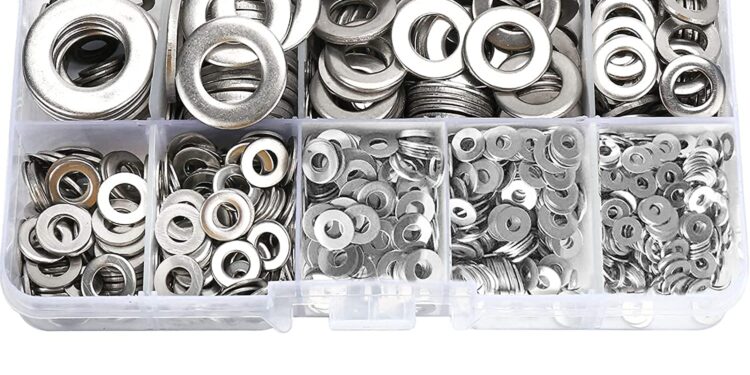Washers are a type of fastener that can serve multiple purposes and are essential to a wide variety of applications. They serve two main purposes: to evenly distribute the pressure of the nut or head of a fastener over a surface without causing damage, and they ensure that the nut is pressed against a smooth surface, which reduces the likelihood that the nut will become loose over time.
There are various different washer types and it’s important to know them and their applications given the wide range of alternatives available. In this article we will discuss the different types of washers and when to use them.
Spring washers
When fasteners vibrate or expand due to heat, a spring washer is utilized to supply axial load. They are there to restrict movement. Metal spring washers are frequently applied to springs that are more expensive, heavier, and take up more space.
They are ideal for applications that call for some degree of adaptability. The aerospace industry frequently uses spring washers in actuators on airplanes, including the flying controls and landing gear, for all of the aforementioned reasons.
Flat washers
Flat washers, also referred to as plain washers, disperse the fastener’s weight while lowering heat and friction as it is tightened. The bearing surface won’t sag beneath the weight thanks to flat washers.
The usage of flat washers as spacers is very popular in household and commercial applications. Use plastic flat washers instead of metal ones if electrical insulation is required since metal washers act as conductors. If metal flat washers are what you require, they can be found together with rubber flat washers.
Lock and tab washers
For fasteners that have the ability to twist or lose friction from vibration or torque, lock washers are the best choice. Lock washers come in many different forms, but they all work by securing the nut and bolt to prevent loosening. And some even use their ends to bite into the bolt and nut.
These mild-steel washers produced by aerospace companies are popular in the automotive and aerospace sectors of the transportation industry. Lock washers are also used in electrical and PCB assembly in home goods like washing machines.
Tab washers are viewed by some as a distinct kind of lock washer, while others believe they stand alone. It can either have one tab, several tabs, and notches, or it can be made to lie flat without any tabs or notches at all. Tab washers are perfect for difficult areas because they can withstand intense heat or strong vibrations.
Shoulder washers
In electronic equipment, shoulder washers are used as bushing to insulate fasteners or shafts from heat and electricity. They are typically made of non-conductive materials like nylon because of this. Avoid using them in humid situations.
Finishing washers
These are referred to as countersunk washers and are frequently described as having the appearance of a small dog dish without the bottom. These washers offer your fastener good insulation and protection from harm.
These are not only useful but also visually appealing. They enable the installation of flat or oval head countersunk screws with the bearing surface of the component. They are frequently used in consumer applications including furniture and cabinetry.
The purposes of washers
Washers give the assembly you’re building a longer lifespan. Skipping washers can significantly shorten the lifespan of your components, therefore careful consideration must be given to how your assembly is put together. Essentially, a shortage of washers could spell disaster for the goods or components you’re making.
Most washers are designed to be used with threaded fasteners, and their main function is to disperse the load among those fasteners in an even fashion. In the material they are forced into, threaded fasteners put a strain on it. Wood may fracture around the surface after being driven by a screw, for instance. By dispersing the fastener’s load uniformly throughout the material’s surface, washers lower the likelihood of this kind of damage. The use of washers is not necessary for all materials. Waxes, for example, are useful to prevent stress-related damage when the threaded fastener is pressed into wood and other relatively soft materials.
Eccentric lock washers can be used with commercially available hex nuts to prevent screw loosening instead of traditional spring or lock washers. There are no specialized tools needed to fasten these washers. They are therefore just as simple to operate as flat or spring washers.
Final thoughts
In order to reduce friction and loosening, washers are typically utilized to distribute the strain on fasteners. Regardless of the washer that is used, the best way to guarantee a solid hold and a secure application is to tighten with the right torque.







